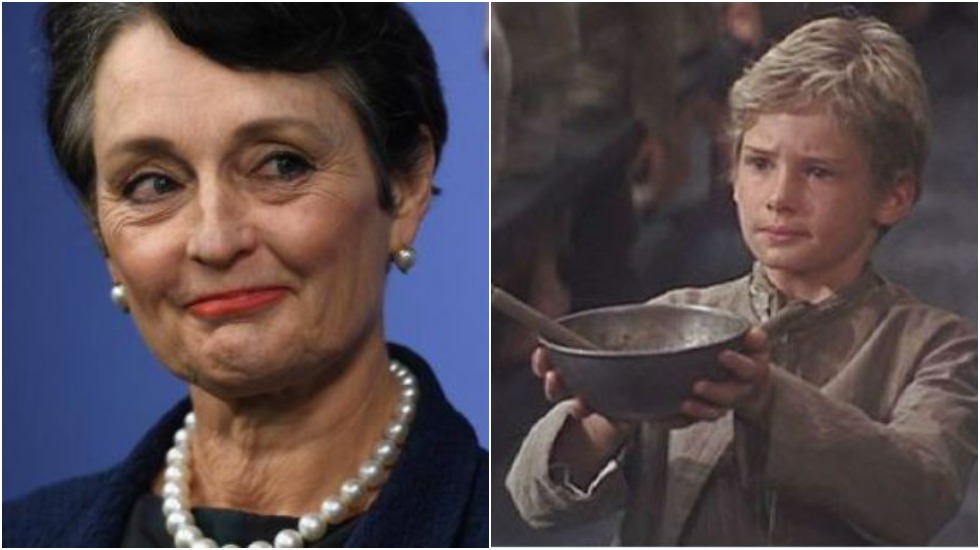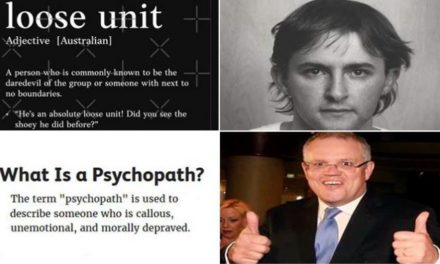Pru Goward, author of the controversial AFR column, and Oliver Twist: “Please miss, may we have some more?”
Australia bore witness this week to the most horrid of events. It was not a pandemic or lockdown, riots, terrorism or baby snatching. No, it was, horror of horrors, the emerging into the light of the underclass. Not only that, but it was seen through the lens of Marxist analysis. As if the country did not have enough on its plate.
The author of this spectacle was Pru Goward, a former Liberal NSW government minister, and now a university professor of social interventions and policy, in a column for The Australian Financial Review.
The column has been criticised, to which Goward has claimed it has been “badly misunderstood”. She told The Guardian she hoped it would help “the readers of the AFR think differently about those at the bottom of the socio-economic ladder”.
“I have applied a Marxist analysis which some might say is old fashioned but which explains to me why people judge others as unworthy,” she said.
In the same Guardian piece, Cassandra Goldie, chief executive of the Australian Council of Social Service, had a different view. People at the council were “deeply disturbed by the contempt shown for people on low incomes in this piece.
“This is after all Anti-Poverty Week.”
But taking nothing away from the poor (well you couldn’t, could you, except their dignity), the equation arises that for every action there is a reaction, thus for every underclass there must be an overclass.
As luck would have it, also something the poor seem destined to have little of, I have found a column within a dream. After all, when you apply filters or lenses to life, who can say what’s real these days? Call it my own personal dialectic.
This is it:
My fascination with the overclass began in my childhood. It has stayed with me ever since.
I remember its origins as clearly as finding a shiny penny on the ground. What a fateful day it was. I was doing my usual end-of-week round of the neighbourhood after the garbage men had been, hoping to find a scrap of food or clothing that I could take home to my dozen snivelling siblings. The garbage truck was always in a hurry; I suppose wanting to leave the begrimed streets they were not in much of a mood to pick up everything that fell from a bin.
This day, among the rags and bones, was a cutting from a newspaper. It detailed the life of a family who had fallen on hard times. They had had to sell their estate in the country and get by with only their main home in the city, and only have occasional recourse to their holiday home by the sea. They were mortified. The father was stoic, by the look of his gaze in the photograph, but the mother you could see looked ashamed, and the two children, looked positively grief-stricken. Such times, I thought. I felt sorry for them, yet I did not know them.
One remark in the article has stayed with me, “How could this happen to our class of people?” asked the mother.
PLEASE HELP US CONTINUE TO THRIVE BY BECOMING AN OFFICIAL FOOTYOLOGY PATRON. JUST CLICK THIS LINK.
My family never asked this. Perhaps it was a burden of the other class exclusively. Poor things. I was a child at the time. I couldn’t pretend to understand them. Fascinated, yes. Understanding of them, no. They could have as much been animals in the forest to me as fellow humans. But then I think I can better see why a rabbit might act the way it does than a species of the overclass. You may as well try to catch the wind for that.
‘Tis passing strange how natural selection has acted upon them. Or not acted. They continue to multiply despite having no regard for the entirety of the ecosystem. This self-reverential sense of entitlement is seen in mannerisms and language. And, of course, in self-propagation. In this country, they have no natural predator.
It is a shock to realise that this land of the fair go, has fairly gone, if it ever was. To put it crudely, you are either one of us or one of them. It’s a fallacy to think that one relies on the government more than the other; there is just different services for different aims; say survival for one class of person, and, with a bit of financial manipulation, a second townhouse with harbour views for the other.
And here’s a curious thing. I don’t dislike them. I know that perhaps I should. I should despise their talking down to us, and of us, their self-interest. I should be reviled at their generalisations of us: lazy, slovenly, a weight on the system, a proclivity to procreate.
But the overclass, perhaps innately, have a repugnance that is hard to overlook. It is their equating of a human life as a resource, much like buying more shares for your portfolio or mining a quarry to help the country’s gross domestic product.
And it’s not something you could ask of the overclass, how to harness the force that such people represent. That would be an exercise in deficit spending. I’m not sure either if you would ask of them, yes, but are you all happy how would they respond, no deign to respond? After all, they have such burdens on their shoulders, such as how not to mix with us. It could result in something quite unknown to them, and for which they would be unprepared: cognitive dissonance with us, the underclass.
The best, and most comfortable, way for them to view us is as a unit of society, that is, their aspect of our situation is best seen, with the least amount of being too condescending, as underperforming. So much potential to turn the wheels of industry, and therefore make profits for the overclass, and what do we do instead? Squander it, as if it’s our obstinate choice. As if we cock a snook at them out of sheer spite.
What would Karl Marx think? We leave our fate to market forces. Parasites. Lump us all together as proles. We must deserve it.
Excuse me now while I listen to “Working Class Hero”.












That was a great rejoinder.
“……this land of the fair go, has fairly gone, if it ever was.”